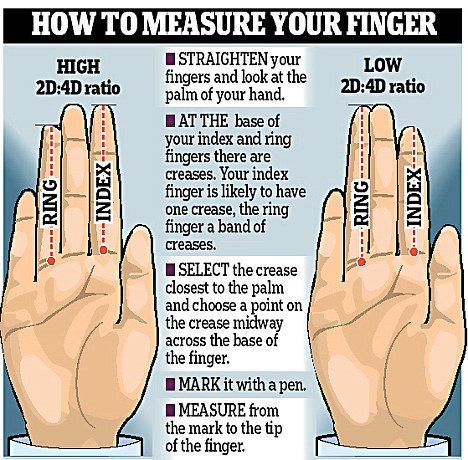What the length of your index finger says about you
The idea that the shape of your hands indicates something profound about your sexual proclivities, the films you like, your athletic ability and your prowess on the stock market seems bizarre.
And yet for many decades now, scientists have noticed an extraordinary link between the ratio of two digits on the hand — the ring and index fingers, known in scientists’ jargon as 2D and 4D — and a whole host of seemingly unrelated traits.
Evidence is growing that this ‘digit ratio’, especially when applied to the right hand, is a fundamental indicator of sexuality, aggression and diseases suffered by men.

Pointing the finger: Scientists have noticed a relationship between finger measurements and a host of unrelated traits
This week, for example, strong evidence has emerged of a link between the ‘2D:4D finger ratio’ and a man’s likelihood of developing prostate cancer.
Specifically, men whose index fingers are longer than their ring fingers are significantly less likely to develop the disease, according to scientists at the Institute Of Cancer Research.
Working out your digit ratio is not simply a matter of looking at your hand and comparing the position of the tips of the fingers. You must measure the distance from the midpoint of the lowest crease at the base of the finger, on the palm side, to the very end of the fleshy tip (obviously the fingernail does not count!).
A long index finger also correlates strongly with a lower risk of early heart disease and, in women, a higher risk of breast cancer and greater fertility.
People with relatively long index fingers are also more likely to suffer from schizophrenia, allergies, eczema and hay fever.
Young boys are more likely to be clingy and anxious than their low-ratio peers but also, ultimately, less attention-seeking and better behaved in school.
'People with short index fingers make better soldiers, engineers, speculators and chess players, and are better at solving problems such as crosswords. They are also more likely to be left handed'
While a long index finger is considered a more feminine hand — men who have them are more likely to be homosexual — a short index finger relative to the ring finger is a more masculine hand.
It correlates with higher male fertility and sperm counts, higher levels of aggression and increased aptitude for both sport and music.
Women who have this masculine finger pattern are more likely to be lesbians than those who don’t, and display higher levels of aggression — as well as enjoy greater professional success.
The extraordinary thing is that these assertions are based on serious scientific evidence. It was as long ago as the late 1700s that people noticed that a greater proportion of men have shorter index fingers than do women.
But it was not until the 1980s that scientists began to wonder if the digit ratio could be linked to more than simply being male or female.
The first such study was conducted on women, and found a link between a short index finger — or more ‘masculine’ ratio — and female assertiveness. Since then, the floodgates have opened, showing links between the digit ratio and more than 100 psychological traits and propensities to various illnesses.

Revealing your hand: Digit ratios of both men and women can suggest certain personal characteristics
So what is going on? Can finger length really determine your behaviour and vulnerability to certain diseases? The truth is that it is not finger-length per se that is having all these profound and dramatic effects.
According to developmental biologist Dr John Manning, who has been analysing digit ratios for more than 20 years, this subtle difference in finger lengths is linked to a foetus’s exposure in the womb to sex hormones, notably the ‘masculine’ hormone testosterone.
Put simply, more testosterone equals a greater chance of a more ‘masculine’ hand, i.e. one with a relatively short index finger.
And it is this exposure to testosterone in the womb that has very profound effects on our behaviour and susceptibility to diseases.
Studies have found that foetuses which have had a high exposure to testosterone — and have short index fingers — tend to be associated with an extroverted personality, a willingness to take risks, higher levels of aggression, stronger muscles and, interestingly (because musical ability is not commonly identified as particularly ‘masculine’), a much greater likelihood of playing an instrument well.
'Of course, the rules are not hard and fast, but people of both sexes with relatively short index fingers tend to be more sexually adventurous'
Of course, the rules are not hard and fast, but people of both sexes with relatively short index fingers tend to be more sexually adventurous. They are more likely to experiment with drugs; they like watching violent movies and become addicted to alcohol more easily.
People with short index fingers make better soldiers, engineers, speculators and chess players, and are better at solving problems such as crosswords. They are also more likely to be left handed.
But short index fingers have also been linked to a higher chance of ending up in prison, being murdered, going mad — and in children higher rates of hyperactivity and attention deficit disorder.
People with short index fingers may be poorer and find it harder to hold down a job. They suffer more infectious diseases and probably, on average, do not live as long.
What is a mystery is why this relationship between testosterone levels in the womb and finger length evolved.
What Professor Manning and others have noticed is that there may be an element of ‘sex selection’ going on with hands as well. Women often remark on ‘masculine’ hands and Manning speculates that this might be a subconscious assessment of the digit ratio.
It may be, as Manning says, that a long index finger in men evolved for purely functional reasons. Many evolutionary anthropologists have speculated that, along with our ability to manipulate fire, one of the key reasons why humans became so successful was our ability to project our strength from a distance by using weapons such as the spear, slingshot and the bow-and-arrow.
Scientists have found that a longer wedding ring finger can help increase accuracy when throwing objects. And men who could throw well killed more animals, ate better and thus made better mates. So they would have been preferred as partners by the available females, thus ensuring that the masculinity-long ring finger link was passed on.
A nail-biting test of your health
Doctors can tell a great deal about how healthy we are by looking at our fingernails. In particular, sudden changes in the shape, thickness or colour of our nails are usually a sign that something is amiss.
A whitening nail bed is often a sign of anaemia. White nails in general could signify that something is wrong with your liver, spotting on the nails could be due to calcium deficiency and horizontal grooves can be a sign of diabetes, circulatory disease or malnutrition.
Most watched News videos
- Bill Maher slams LAFD's 'best lesbian for the job' chief
- Moment Russian influencer throws two-month-old son into a snowdrift
- Incredible moment homeless mum dog carries dying pup to vets
- Massive waves strike Sydney ferry during wild thunderstorms
- Woman is arrested for bad behavior at Ohio car wash
- The official trailer of season 6 of 'The Kardashians'
- Wild scenes of a commuter ferry as severe thunderstorms hit Sydney
- Everything Trump has said he will do on 'Day One' of his presidency
- WATCH: Scott Jennings battle it out on CNN panels over the past year
- Arrests at pro-Palestinian demo after police ban synagogue march
- Bryan Callen shoots down Rogan's comment on LA looting conspiracy
- Helicopters deployed to rescue as ski lift collapses in Spain























































































































































































































































































































































































































